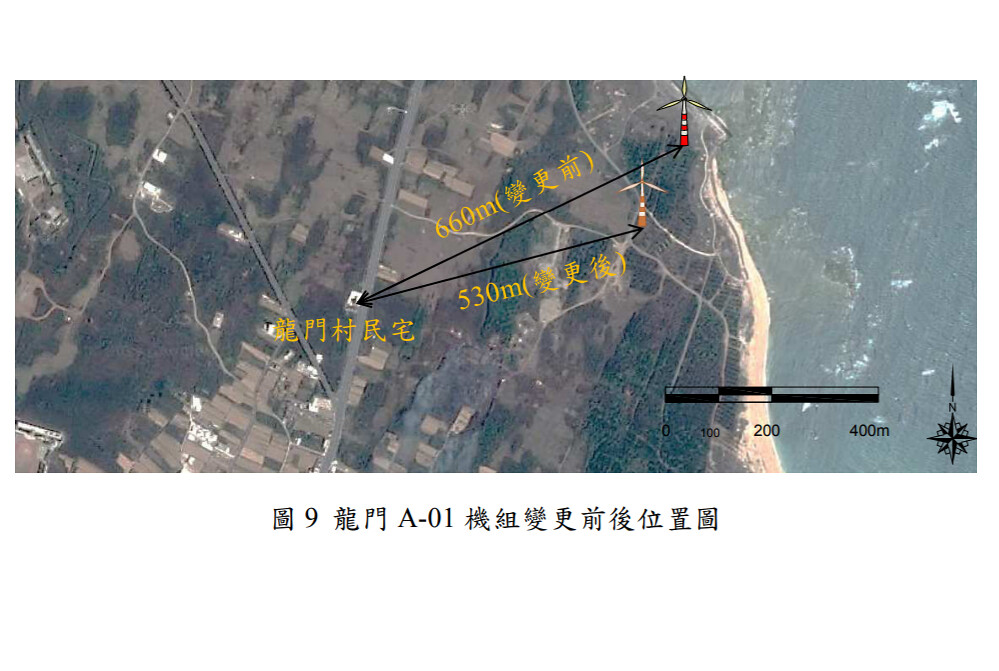Penghu, Taiwan, August 8, 2018 (TEIA)– Wind Turbine A-01 of Longmen (龍門) will be relocated 180 meters south-southwest of the original site proposed in Penghu Low Carbon Island Development (澎湖低碳島計畫) because it is bad for Feng Shui (風水) and has possible shadow flicker and noise pollution. Taiwan Environmental Protection Administration (Taiwan EPA) has passed the relocation plan's preliminary review on the analysis report on the difference of the environmental impacts on August 8, 2018.
Taiwan Power Company (Taipower), the developer, comments that a lower power generation efficiency is expected but relocating this wind turbine would win local residents' support. Yet, repeated protests from the residents may not be soothed by this simple relocation. Committee members of the preliminary review and Taipower all believe that a further communication with the residents is needed.

Environmental impact assessment for the Penghu Low Carbon Island Development was passed in 2014; its goal is to increase local wind energy installed capacity by 32 kilowatt (kw). In Taipower's installation proposal, they are going to install six wind turbines in Longmen, two in Jiangmei (講美), and three in Dachikan (大赤崁). Taipower estimates that 116 megawatt hour (mwh) will be generated by these wind turbines annually. Currently, three out of six wind turbines are completed in Longmen.
The original site of this going-to-be relocated Wind Turbine A-01 is on the beach. However, local residents strongly against this site because it is bad for Feng Shui of a nearby cemetery, Guoyeh A Site (菓葉A遺址). Chen Yi-Cheng (陳一成), Head of Taipower's Renewable Energy Department, notes that the site selection meets all legal requirements but Taipower respects inputs from the residents. Hence, Taipower will relocate the wind turbine 180 meters south-southwest of the original site, and 40 meters away from the Guoyeh A Site, with assistance from Penghu County Government and Forestry Bureau. Though power generation efficiency will be lower in the new site, the efficiency remains within tolerance.
In addition to aforementioned Feng Shui issue, local residents have been repeatedly protesting the installment for its possible shadow flicker and noise pollution since last March. Now, the new site is much closer to the settlement and the shortest distance to the nearest house is 530 meters. Liu Shi-Ping (劉希平) and Jeng Ming-Shiou (鄭明修) of Taiwan EPA's Environmental Impact Assessment Review Committee both concern about possible future conflicts.
Taipower claims that in their professional simulation and assessment, estimated sound pressure level of the noise in the nearest house would be 25.1 dB(A) and its low-frequency noise would be 22.0 dB(A). The values are within the Taiwan EPA' noise control standards, i.e., daytime and evening at 50 dB(A) and nighttime 40 dB(A). By adding the background value, the noise increment will be 0.0 dB(A). In this sense, the noise will be non-affecting and negligible.
Yet, Jeng Ming-Shiou raises the question of possible shadow flickers in Longmen, where six wind turbines are located east of the settlement. The flickering effect caused by rotating wind turbine blades after sunrise may affect the residents' sights and even cause discomforts. Taipower replies that shadow flickers mostly occur in high latitude areas with slanting sunlight. The impacts should be modest since Taiwan is at lower latitudes. In their estimation by utilizing solar angles data from Taichung, where shares a similar latitude with Penghu, shadows of the wind turbines will only appear west side of the turbine before noon. The shadows would be far from the settlement, thus it should have no impact to the residents.
Despite this development project successfully passing its environmental impact assessment, it still awaits supports from the local residents. Taipower promises to continue to communicate with the residents to reduce their psychological stress from the wind turbines.
The original article can be found here.


